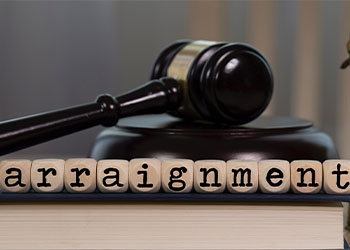What to Expect at Your Arraignment
Sept. 27, 2023
 While many people have heard the word “arraignment” referred to on a TV show, or they know it’s somehow part of a court proceeding, most are unable to define what it is. So, what is it exactly? What will happen at the arraignment? If you or someone close to you has recently been charged with a crime, you’ll need to be prepared for a lengthy legal process in which a criminal arraignment is one of the first steps.
While many people have heard the word “arraignment” referred to on a TV show, or they know it’s somehow part of a court proceeding, most are unable to define what it is. So, what is it exactly? What will happen at the arraignment? If you or someone close to you has recently been charged with a crime, you’ll need to be prepared for a lengthy legal process in which a criminal arraignment is one of the first steps.
Throughout this time, it’s essential that you work with an experienced criminal defense attorney to ensure you fully understand each step of the proceedings. If you live in or around Pensacola, Florida, including the area of Crestview, Fort Walton Beach, or Milton, contact David Lee Sellers, PA to schedule an appointment.
What Is an Arraignment?
An arraignment is typically the defendant’s (the person charged with the crime) first physical appearance in court. The one exception to this would be if you made a request for setting bail—you may see a judge earlier. At the arraignment, a judge will formally read the charges against you by the state. Additionally, part of the arraignment is to inform you of your right to legal counsel. Although you aren’t required to have an attorney present, you should.
When Does the Arraignment Take Place?
The arraignment is usually one of the first steps in a criminal court proceeding and can happen as quickly as within two to three days of the initial arrest. However, if the defendant was able to be placed on bail, the arraignment may not occur for several weeks.
Even though you will be in a courtroom in front of a judge, an arraignment is not the same thing as a trial, and this is not the time for either side to present evidence one way or another regarding your charges. Even so, it is important that you take it seriously and recognize that it’s an integral and potentially consequential step in the larger process.
What Occurs at the Arraignment?
Arraignments occur at both the felony and misdemeanor levels. In many cases, after a judge lists your charges, it will then be your opportunity to enter a plea, which will typically be “guilty,” “not guilty,” or “no contest.” However, in some felony cases, the judge will not accept a plea, especially if the crime is of a serious nature.
On the other hand, if you’ve been charged with a misdemeanor crime, you may be able to enter a plea of guilty or no contest, and the judge will issue a sentence right there. This means you would not have to attend any more court appearances and instead accept this early ruling.
Do I Need an Attorney for the Arraignment Process?
Technically, you do not need a lawyer present at your arraignment, but it’s highly recommended that you do so. Entering a plea at this stage may not seem like a major step, but what you say during the arraignment can have a huge impact on the rest of the process and ultimately the penalties you could face. When you start working with a skilled lawyer right from the start, they can analyze your case and the charges against you and advise you on your best course of action to mitigate the possible consequences.
Turn to Trusted Legal Help
If you’re facing criminal charges and have not yet contacted a lawyer, reach out to David Lee Sellers, PA to speak with a trusted professional who will always have your best interests at heart. If you’re in the Pensacola, Florida, region, call today to set up a consultation and start learning more about your options.
